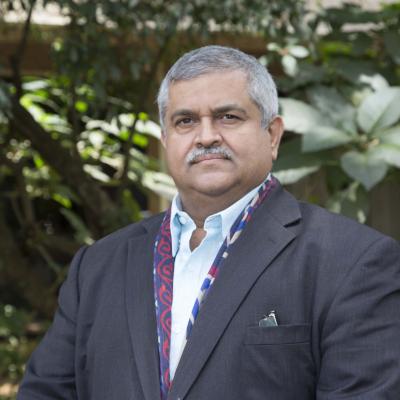
Air pollution kills an estimated 7 million people every year. Unsustainable practices, irresponsible corporate behaviour and policy incentives are some of the fundamental causes of air pollution, says Satya Tripathi from UN Environment.
Q&A
Q: Air pollution causes about 7 million premature deaths a year. What are the main causes of air pollution and what can be done about it?
Unsustainable practices and the prevalence of a misconstrued paradigm for growth, largely determined by irresponsible corporate behaviour and policy incentives, are the fundamental causes of air pollution. Many of the challenges faced in developing countries such as haze caused by burning of agricultural waste, indoor pollution from cooking using fossil fuels and emissions from vehicles and industries are due to ineffective legislations and inefficient consumption and production practices that excludes triple-bottom-line metrics when assessing performance, which extends beyond corporate profits to measuring effects on communities, natural resources and health as indicators of success.
Unsustainable practices and the prevalence of a misconstrued paradigm for growth, largely determined by irresponsible corporate behaviour and policy incentives, are the fundamental causes of air pollution.
This can be achieved through improved environmental, social and governance standards that incorporate sensitive nature and community friendly safeguards, redirecting subsidies for incentivizing shift in practices, integrating circular economy practices that promote “cradle to grave” approaches in manufacturing and other industries and having support mechanisms in place like innovative finance models that can scale existing solutions for air pollution and increasing investments in ecological infrastructure.
Let me reiterate a point the UN Secretary-General emphatically made recently: ‘We need to tax pollution, not people!’
Q: Researchers estimate that more than 8.3 billion tonnes of plastic has been produced since the early 1950s. About 60 per cent of that plastic ends up in either a landfill or the natural environment. Is the world waking up to the problem? What’s UN Environment doing to tackle this challenge?
The Clean Seas and Beat Plastic Pollution campaigns are intended to improve awareness about the massive problem of waste and its impacts on nature. Mobilizing governments and encouraging countries to switch away from single-use plastic, improving waste management and better education have been a focus of these campaigns. Several countries have pledged to change practices. For example, Indonesia will reduce its marine litter by 70 per cent by 2025 and India will abolish single-use plastic by 2022.
Simultaneously, it is imperative to change business practices to ensure that issues of inadequate infrastructure, a dearth of efficiency efforts targeted at reducing waste, and little collaboration across value chains are addressed so that there is widespread transformation. The leadership of the private sector in supporting this transition has not been leveraged sufficiently from the perspective of meeting SDG 12 targets.
The leadership of the private sector in supporting this transition has not been leveraged sufficiently from the perspective of meeting SDG 12 targets.
Various strategies for enhancing access to sustainable finance, providing platforms for strengthening participation of local SMEs, which represent 98 per cent or more of all businesses, in global value chains and improving availability of differentiated certifications and guidance standards that take into account the industry – specific opportunity costs for SMEs of shifting their production and consumption processes are being considered.
Q: What’s zero-budget natural farming? How can it support communities around the world in meeting the SDG 12 targets, including the sustainable management and efficient use of natural resources?
Zero Budget Natural Farming (ZBNF) is a scalable model of low-input/high output agriculture that eliminates the use of synthetic chemical fertilizers and pesticides by utilizing local farm-based inputs and regenerates soil health along with preventing the degradation of ecosystem services. In a nutshell, it shifts the focus from ‘soil chemistry’ to ‘soil biology’ in agriculture. Soil holds three times as much carbon as the atmosphere, and this has enormous potential for being a great source of climate action through soil carbon sequestration.
ZBNF is being implemented by the state government of Andhra Pradesh in India, which is transitioning 6 million farmers and 8 million hectares of crop land to 100% synthetic chemical free agricultural practices by 2024. By the end of 2019, they would have enrolled a million farmers into the program.
ZBNF provides a ‘blueprint’ for system-scale transformation by shifting the agricultural industry and farming systems towards more ecologically sensitive practices thereby creating green value chains that improve environmental and community health across the spectrum.
Satya Tripathi is the UN Assistant Secretary-General and Head of New York Office at UN Environment. A development economist and lawyer with over 35 years, he has served with the United Nations since 1998 in key positions in Europe, Asia and Africa in the areas of climate change, human rights, democratic governance and legal affairs.
